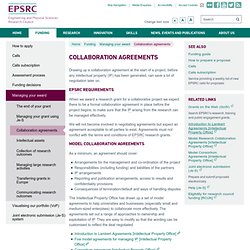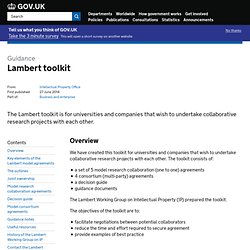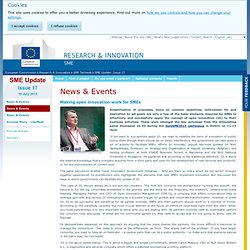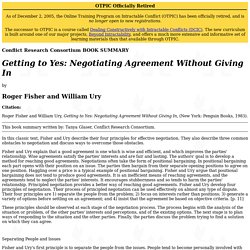

S.M.A.R.T. Objectives. Setting-smart-objectives.pdf. Collaborative Working Made Simple. Collaborate to compete : a strategic weapon for SMEs. Collaboration agreements. Drawing up a collaboration agreement at the start of a project, before any intellectual property (IP) has been generated, can save a lot of negotiation later on.

EPSRC requirements When we award a research grant for a collaborative project we expect there to be a formal collaboration agreement in place before the project begins, to make sure that the IP arising from the research can be managed effectively. We will not become involved in negotiating agreements but expect an agreement acceptable to all parties to exist. Agreements must not conflict with the terms and conditions of EPSRC research grants. Model collaboration agreements As a minimum, an agreement should cover: Lambert Toolkit for Collaborative Research. Overview We have created this toolkit for universities and companies that wish to undertake collaborative research projects with each other.

The toolkit consists of: a set of 5 model research collaboration (one to one) agreements 4 consortium (multi-party) agreements a decision guide guidance documents The Lambert Working Group on Intellectual Property (IP) prepared the toolkit. The objectives of the toolkit are to: facilitate negotiations between potential collaborators reduce the time and effort required to secure agreement provide examples of best practice.
Making open innovation work for SMEs requires a focus on common objectives. Simplification of processes, focus on common objectives, enthusiasm for and dedication to set goals are only a few of the basic elements required by SMEs to effectively and successfully apply the concept of open innovation (OI) to their business activities.

These were amongst the key outcomes from the stimulating panel discussion on OI during the EuroSME2013 conference in Dublin on 11-12 June. ‘If we want to successfully apply OI, we need to redefine the term of innovation of public policy. Even though there should be no direct interference, the government can take quite a lot of actions to facilitate SMEs’ efforts to innovate,’ argued key-note speaker Dr Wim Vanhaverbeke, Professor on Strategy and Organisation at Hasselt University (Belgium) and visiting professor at both ESADE Business School in Barcelona and the NUS National University in Singapore. The panel discussion entitled ‘Open Innovation Government Initiatives – Why are there so many which do not work?’
Consensus decision-making. Members of the Shimer College Assembly reaching a consensus through deliberation.

Consensus decision-making is a group decision-making process that seeks the consent of all participants. Consensus may be defined professionally as an acceptable resolution, one that can be supported, even if not the "favourite" of each individual. Consensus is defined by Merriam-Webster as, first, general agreement, and second, group solidarity of belief or sentiment. It has its origin in the Latin word cōnsēnsus (agreement), which is from cōnsentiō meaning literally feel together.[1] It is used to describe both the decision and the process of reaching a decision.
Consensus decision-making is thus concerned with the process of deliberating and finalizing a decision, and the social and political effects of using this process. Objectives[edit] As a decision-making process, consensus decision-making aims to be:[2] INFOGRAPHIC: Negotiating Agreement Without Giving In. Getting to Yes: Negotiating Agreement Without Giving In.
Conflict Research Consortium BOOK SUMMARY by Citation: Roger Fisher and William Ury, Getting to Yes: Negotiating Agreement Without Giving In, (New York: Penguin Books, 1983).

This book summary written by: Tanya Glaser, Conflict Research Consortium. In this classic text, Fisher and Ury describe their four principles for effective negotiation. Fisher and Ury explain that a good agreement is one which is wise and efficient, and which improves the parties' relationship. These principles should be observed at each stage of the negotiation process. Separating People and Issues Fisher and Ury's first principle is to separate the people from the issues. The authors identify three basic sorts of people problems. Emotions are a second source of people problems. Communication is the third main source of people problems. Generally the best way to deal with people problems is to prevent them from arising. Focus on Interests Good agreements focus on the parties' interests, rather than their positions.